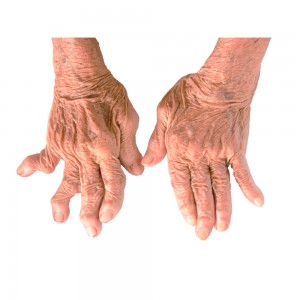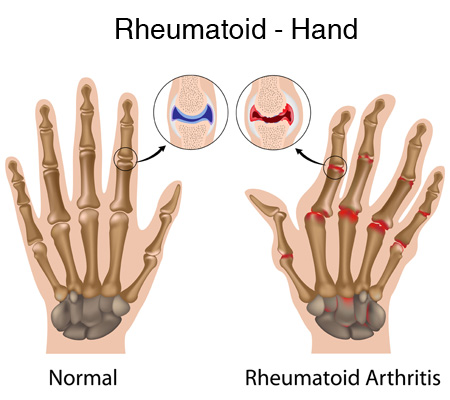 Rheumatoid arthritis (RA) is a chronic autoimmune disease causing inflammation of the joints. In RA the membranes around the joints become inflamed and release enzymes that cause damage to the surrounding cartilages and bones. In severe cases, other tissues and body organs also can be affected.
Rheumatoid arthritis (RA) is a chronic autoimmune disease causing inflammation of the joints. In RA the membranes around the joints become inflamed and release enzymes that cause damage to the surrounding cartilages and bones. In severe cases, other tissues and body organs also can be affected.
Individuals with rheumatoid arthritis often experience pain, swelling, and stiffness in their joints, especially those in the hands and feet. Motion can be limited in the affected joints, curtailing one’s ability to accomplish even the most basic everyday tasks. Rheumatoid arthritis can eventually result in bone erosion and joint deformity.
The pain and disability associated with rheumatoid arthritis can affect a person’s work and family life.
Lifestyle changes and self-care measures, when used along with rheumatoid arthritis medications, can help to manage the pain and other symptoms:
Respect Your pain:
-Joint protection is a proven strategy to help you manage rheumatoid arthritis pain and perform daily activities more easily.
-Arthritic joints can’t tolerate as much stress as healthy joints. Pushing, pulling or twisting motions can be painful, so avoid unnecessarily stressing your joints.
-Don’t use the affected joint vigorously. You might make the pain worse and increase your risk of developing joint deformities.
-Don’t give your joints the chance to become stiff — keep them moving.
-If pain persists for one hour after you do an activity, consider changing how you do it.
-Take rest breaks in between your work.
-Alternate between sitting and stretching, and light and moderate activities, throughout the day.
-If you have pain in your feet, wear proper shoes.
[box type=”note” ]We treat patients from USA, UK, Canada, Australia, UAE & 180 more countries. Get expert opinion on your ailment, click here to ask Dr. Shah’s team directly.[/box]
Arrange your work area wisely:
-While sitting use good back and foot support. Your forearms and upper legs should be well-supported, resting level with the floor.
-For typing or reading, give proper support to your forearm and wrist. An angled work surface for reading and writing is easier on your neck.
-While standing the height of your work surface should enable you to work comfortably without stooping.
Apply heat or cold fomentation:
Heat can help ease your pain and relax tense, painful muscles. Cold may dull the sensation of pain. Cold also has a numbing effect and decreases muscle spasms.
Take a walk:
While walking benefits everyone, it’s especially helpful if you have RA. Walking helps you maintain a healthy weight, which eases stress on your joints. It also strengthens the muscles around your joints, which can reduce joint pain and inflammation.
Exercise regularly:
Gentle exercise can help strengthen the muscles around your joints, and it can help fight fatigue you might feel. Avoid exercising tender, injured or severely inflamed joints. Swimming, yoga, aerobics and other exercises that are easy on the joints can help keep the body properly stretched while not placing too much pressure on the body and can improve the mobility of your joints.
Eat healthy for your joints:
Whole grains, fresh fruits and vegetables, fish, olive oil, and garlic are filled with omega-3 fatty acids. There’s good evidence that omega-3 oils are helpful in the treatment of inflammatory diseases.
Watch a video testimonial of a patient treated for Rheumatoid Arthritis successfully at Life Force.
Reduce your Stress:
Stress can be an intensifier of pain. If you are stressed out it can increase the amount of pain you feel. Thus, keeping your environment as stress-free as possible can reduce your arthritis pain. Find ways to cope with pain by reducing stress in your life.
Know your limits:
Take rest when you’re tired. Rheumatoid arthritis can make you prone to fatigue and muscle weakness.
Take proper sleep:
Get 8-9 hours of sleep per night. This gives your body time for essential rest and recuperation.
Reduce excess body weight:
Excess weight puts a strain on your body, especially your lower back, hips, knees, and ankles. Losing weight can help decrease your pain and increase your energy.
Above mentioned simple lifestyle changes and the self-care measure will help you to manage your RA along with proper medication.
Homeopathy offers excellent treatment for the cases of RA, especially for those who have not developed joint deformities. The pain control is very effective with homeopathy and this is without any side effects whatsoever. The treatment can also have a role to play in controlling the progress of the condition to some extent and in delaying the onset of complications. Homeopathy is very strongly suggested for all cases of Rheumatoid Arthritis.
Get in touch with us to know how research-based medicines at Life Force can help you to manage your Rheumatoid arthritis.
Dr. Aparna Hingmire ,Life Force team.
[box type=”note” ]Got Questions? Get answers to all the questions regarding your ailment from Dr. Shah directly. Click here.[/box]
Also read about Ankylosing Spondylitis, Psoriatic Arthritis, Adverse effects of Methotrexate




lipitor 80mg oral order lipitor 10mg pills lipitor pills
buy proscar pills purchase finasteride for sale diflucan over the counter
buy ciprofloxacin without prescription – order keflex 125mg generic oral augmentin 375mg
order ciprofloxacin 1000mg – keflex generic buy augmentin 1000mg for sale
buy flagyl online cheap – order cefaclor 500mg without prescription zithromax 500mg without prescription
valtrex 500mg without prescription – buy generic diltiazem 180mg order zovirax 800mg online
oral stromectol cost – buy sumycin generic tetracycline for sale online
metronidazole 200mg price – buy azithromycin 500mg pills buy generic zithromax
buy acillin no prescription penicillin for sale order amoxil generic
lasix 40mg brand – order furosemide 40mg generic buy captopril 25 mg
buy glucophage generic – lincocin 500mg usa buy lincocin tablets
buy retrovir no prescription – order rulide 150mg for sale buy allopurinol sale
clozapine 100mg sale – order amaryl 1mg pill order pepcid pill
where can i buy seroquel – generic seroquel eskalith without prescription
order clomipramine 25mg without prescription – anafranil cost pill sinequan 75mg
purchase hydroxyzine for sale – where can i buy buspar order endep 25mg online cheap
order augmentin 375mg sale – buy generic augmentin 1000mg purchase ciprofloxacin pills
buy amoxicillin online – buy amoxicillin pills for sale baycip order online
buy cleocin tablets – chloramphenicol canada order chloromycetin pills
buy zithromax 500mg generic – order tinidazole 500mg online cheap ciprofloxacin 500 mg usa
stromectol in canada – purchase doxycycline pills order cefaclor online cheap
best antihistamine pills – promethazine tablet theophylline 400mg canada
buy cheap depo-medrol – order azelastine 10ml for sale brand astelin
buy clarinex 5mg generic – ventolin buy online buy ventolin medication
purchase glyburide generic – order micronase online cheap order dapagliflozin sale
glucophage over the counter – acarbose 50mg without prescription brand acarbose
where to buy prandin without a prescription – order prandin 2mg online cheap order jardiance online cheap
terbinafine 250mg ca – fulvicin order online grifulvin v cheap
purchase semaglutide online – buy desmopressin no prescription DDAVP cheap
order famvir for sale – buy valcivir valcivir 500mg canada
order lanoxin pills – buy avalide generic buy lasix online
hydrochlorothiazide canada – buy generic hydrochlorothiazide bisoprolol 10mg pills
metoprolol 50mg cheap – oral micardis 80mg adalat 10mg uk
order nitroglycerin pill – nitroglycerin without prescription valsartan without prescription
simvastatin kick – gemfibrozil gulf atorvastatin shelve
rosuvastatin pills westward – zetia copy caduet await